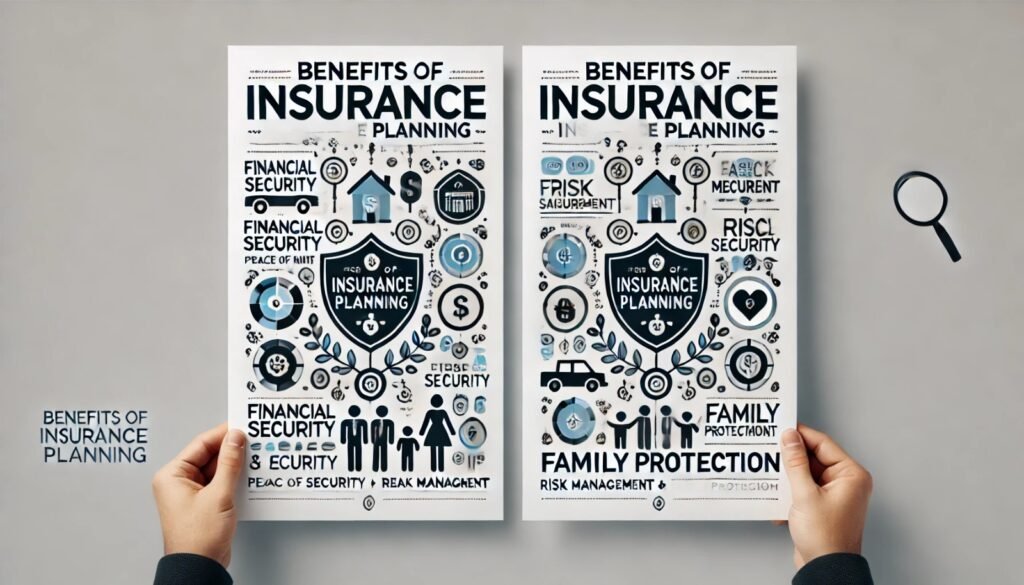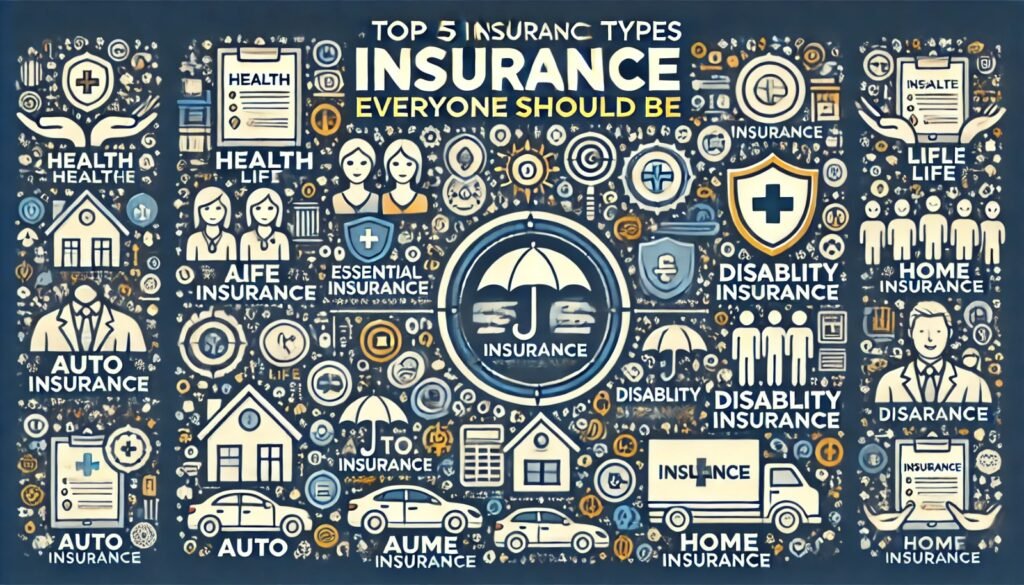Top 5 Insurance Types must need because unfortunately, sometimes incidents happen, such as car accidents, robbery, or the death of your loved ones. At this time, someone spends all his accumulated wealth to overcome the loss. So, that’s why insurance planning is important.
Insurance planning for Top 5 Insurance Types
Insurance is a type of risk management, it means an arrangement in which a company or state takes responsibility to overcome your losses such as sudden accident, death car crash, or illness.
Insurance is essential to protect you and your family from the crisis. When looking for such protection, understanding the types of insurance is necessary. This comprehensive guide dives into the top five insurance types everyone should consider, coverage, and why they are essential.
Benefits of insurance planning:

Tax benefits:
One can lower taxes by buying insurance plans. For example, the amount you pay for health can tax deduction under the Income Tax Act. However, you can lower the tax on your income by buying insurance policies.
Mental satisfaction:
When you have set your plans for the future e.g. a well-planned insurance portfolio, it is a source of mental peace. As you know you have backups for any loss in case of accidents or other damage. You can also plan for the well-being of your family even after your death.
Financial security:
Insurance plans protect your business, from market fluctuations, and other financial uncertainties. So, insurance policies enable you to cover your financial losses in case of any emergency.
Protection against risks:
Insurance plans protect against all risks such as financial, illness, and death. Well-planned insurance secures you and your family from unseen losses of your savings. It also maintains your lifestyle by protecting your savings.
Top 5 Types of insurance everyone should have:
Many types of insurance plans are there. Let’s discuss some of the essential types of insurance everyone should consider:
Vehicle insurance:
Someone can own the insurance for vehicles, depending on the type of vehicle they have. With vehicle or motor insurance plans, individuals can cover their losses in case of vehicle theft, damage, or any other loss. There are two types of vehicle insurance:
What does vehicle insurance cover?
It covers damage to vehicle. If your vehicle damaged due to an accident policy covers the loss.
Third-party liability insurance:
In this kind of insurance, third-party coverage protects the policyholder, if there is a loss or damage to the vehicle. This type of insurance is recommended for older, inexpensive, and cheaper-to-repair vehicles because it reduces the risk and liability of the policyholder.
Comprehensive insurance:
This coverage has broad protection against vehicle loss, accident, and third-party claims from an accident. Under a single policy, the policyholder can get extra protection by buying add-on options. In this way, you don’t have to buy multiple policies for any damage.
Collision coverage:
This type of motor insurance repairs your vehicle in case of an accident without considering the fault. It is essential for high-value vehicles.
Why is vehicle insurance essential?
Without vehicle insurance, in case of any uncertainty or unforeseen accident, you may fall into heavy debt to cover the loss. It can be a stressful condition, in this situation the company ensured to cover the loss.
Life insurance:
Life insurance provides you with loss coverage in case of a policyholder’s death. There are four types of life insurance.

Term life insurance:
This insurance policy is for a certain period ranging from 10-30 years. This kin for an insurance plan is generally cost-effective. If the insurer dies during the policy term, the beneficiary gets the death benefits.
Whole life insurance:
The coverage for the whole life provides guaranteed benefits in the event of death such as cash accumulations. After the death of the policyholder, the insured receives a lump-sum amount. The premium is high in this policy but it provides two benefits, protection and savings.
Universal life insurance:
It is a type of permanent life insurance; like life insurance, it provides death benefits.
What does life insurance cover?
Life insurance pays a lump-sum amount at the death of the policyholder. The beneficiary gets the amount at the end of the policy. The amount covers the policyholder’s family needs, children’s education, and funeral expenses. It also covers the lost income replacement and paying off debts.
Health insurance:
Nowadays medication is not easy, it is quite expensive. Sometimes, income is not enough to meet the expenses for medication, especially in an emergency. Uncertainties are part of life so health insurance protects savings.
What does Health insurance cover?
Health insurance plan helps, cover the hospital, medicine, and routine checkup expenses. One can purchase this insurance from any insurance company, federal health insurance marketplace, offered by an employer, or Medicaid coverage. This policy also covers medical expenses, critical illness, mental health issues, and other treatments depending on the policy.
Before navigating to health insurance, it is necessary to keep in mind some key points:
Firstly, prepare a list of your needs such as monthly or weekly visits and your regular medications.
Secondly, carefully check the insurance coverage to choose the right one, which includes doctor visits, hospital stays, and prescriptions.
Don’t forget to know the three things: annual deductible (the amount the policyholder pays before the insurance kicks in), copayments, and out-of-pocket maximum.
Types of health insurance:
There are two main types of health insurance: individual health insurance and group health insurance, offered by the insurance companies. Let’s dive into the difference between these two types.
Individual health insurance:
This type of insurance covers only one person, the policyholder. Only a single person gets benefits from the policy. The policyholder can buy any add-ons and can directly claim from the company. The policyholder’s age should be at least 18 years.
Group health insurance:
Group health insurance comprises more than one person; it may be a group of employees or family members. The members can buy add-ons but they are limited. A single person does not have the full control over the coverage. Claims are made through third-party administration.
Critical illness insurance:
This coverage provides a lump-sum amount if the policyholder has been diagnosed with any critical disease e.g. cancer or heart disease.
Accident insurance:
It helps to cover expenses in case of an accident. It also provides additional benefits in case of unforeseen mishaps.
The amount you pay before the insurance starts to contribute.
Why is health insurance essential?
Health should be everyone’s priority, so don’t compromise on it. In case of any health issue medical expenses rapidly deplete your savings. However, in this situation health steps in and covers all the medical expenses. You remain stress-free from any uncertain condition.
Home insurance:
This type of home insurance is beneficial for the protection of your home in case of any damage, robbery, or injury. You should carefully document your belongings to manage the process of claim, timely. If your home is to be rebuilt, make sure the coverage is enough for this. If there is a risk to your home, buy other policies such as flood or earthquake insurance.
Renter’s insurance:
If you are living in a renter home, this policy covers the high-value content of your home in case of theft or other damage.
Flood insurance:
Flood insurance is not included in home insurance. The policyholder has to buy this plan separately. It covers the loss that happens due to flood.
Earthquake insurance:
Like flood insurance, earthquake insurance is not included in the home insurance plan. This plan covers the loss due to the earthquake.
Why do you need home insurance?
If your home is damaged, the insurance company covers the expenses of rebuilding your home. It also covers the loss in case of robbery. The renters also benefit from the policy by saving the loss of their high-value belongings. Disability insurance:
It is an essential type of insurance, as it covers the loss in case of any disability to the policyholder.
Disabilities are of two types:
Permanent disability and temporary disability.
If the insured is temporarily disabled, the policy provides an amount that is 50-70% of your pay until the insurer recovers. However, if the insured is permanently disabled, the policy offers a lump-sum payment. Permanent disability may be loss of limbs, loss of eyesight, loss of hearing, etc.
Why is disability insurance essential?
Disability insurance replaces your income if you have become disabled for a certain period and are not able to do work. Disabilities may include loss of vision, and hearing, loss of limbs, complete paralysis and fractures, etc.
Why do you need disability insurance?
No one wants to become paralyzed but illness can happen at any time in life due to an accident. In such circumstances, the policy helps you to overcome the difficult time.
Summary:
Insurance is a key tool to cope with the uncertainties of life. To get the benefits from these policies it is also important to understand the essential types of insurance, their coverages, and needs.
All these policies aid to cover the financial loss whether it is accident insurance, home insurance, or disability insurance. By considering these types, you can protect yourself and your family from the stressful time of your life.
FAQs:
What are the seven fundaments of insurance?
Proximate cause
Insurable interest
Loss minimization
Subrogation
Indemnity
Contribution
Utmost good faith
How insurance is calculated?
Insurance companies use data and statistics to predict levels of risk for a group or individual.
It is an important part of financial planning that ensures the well-being of individuals.
What is an insurance plan?
An insurance plan is a policy or agreement, issued by an insurer to the policyholder. It manages the risks that occur in life
What is the scope of insurance?
Insurance lessens the range of risks. It provides liability insurance and business insurance.

